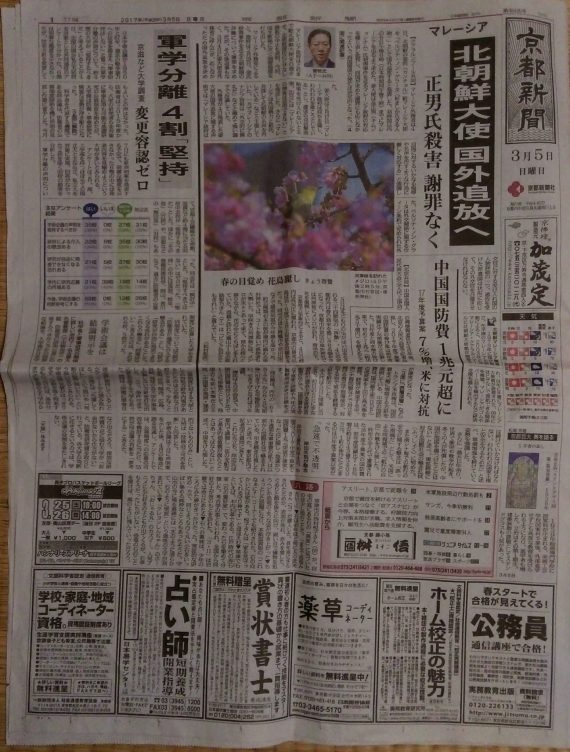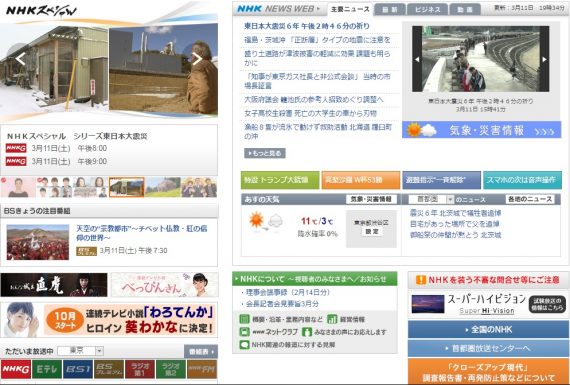
Week 5 Prompt: News
THE NEWS — Each day, The Newseum in Washington, D.C. updates an online digital exhibition featuring some of the most timely front pages from newspapers around the globe. Indeed, as this exhibit is meant to suggest, the “front page” is not merely locational or typographical: it signifies weight and importance and serves as a useful indicator of the issues that matter most to people within a particular geo-political area. But not always. Sometimes, western news—and in particular, national news from the United States—is featured on the front page of ostensibly “local” newspapers and magazines, even though the issues discussed and problems addressed may have only tangential relevance to the locals. This week, think about the “front page” both as a medium and signifier. What stories appear on the front page of newspapers and local news websites today? How does this compare with what ordinary “people-on-the-street” are talking about? For what audience is local news written? Can you reconcile any disjunctions? Provide a photograph of a newsstand, newspaper, magazine rack, or local news website to give us a glimpse of the front page. Then, list the price (in local currency) of the daily newspaper, if one exists.
Sean Corrigan
In Hong Kong it’s quite difficult to take a break from the news. All the subway trains have TV screens that show news, ads, and updates on the celebrity world. It’s all in Cantonese, so I can’t understand what’s being said. But it’s surprising how much visuals can help. Sometimes it’s fun to guess at what’s on the screen just based on the visuals and the small amount of Chinese that I can read, except when the story is clearly about a firebombing attack in a station that I’m just about to pass through. Everyone else watching was weirdly calm about it, so I figured the situation was under control.
When I first got here in January, most of the news reports seemed to be about Donald Trump. Anything people in the US were talking about was being reported in Hong Kong. There’s not quite as much US news now, but it still takes up a lot of air time. The photo below shows a typical news report on the subway. This story was about the man who scaled the White House fence and was caught by Secret Service, and next to it is an announcement to stop the spread of germs, I think.

Below is the front page of the South China Morning Post’s website. They are one of Hong Kong’s longest-running and most trusted news sources. I was unable to find the print version, but I know it exists out there somewhere. A print subscription with delivery costs HK$17 per week, equal to US$2.19

Ben Kelsey
In my admittedly limited experience, the source for all things newsworthy in Japan is the NHK, Japan’s national broadcasting network (think PBS). My host mother watches it every morning and some evenings, and I usually catch the weather and a few stories as I eat breakfast. The morning news seems to be a fairly even balance of international and domestic stories. Recently I’ve been seeing a lot of news about North Korea, and there seems to be something about the education system most days. Indeed, these seem to be the issues that are at the front of everyone’s mind here. The public education system is a big part of Japanese society, and I think people like to talk about it. I’m not entirely sure what’s said about North Korea (my Japanese isn’t quite that good), but missiles and a missing or dead uncle seem to figure pretty heavily in it. There’s also a sort of round-table talk show every Saturday morning that’s themed around a new topic of public debate each week, and that seems to bring in a panel to discuss it.
I would speculate that the news reflects what people on the street talk about because many of them source their information from that news. In a way that is perhaps emblematic of the sense (true or not) among Japanese people that their nation is extremely homogenous and that everyone should and does have the same concerns, I think that the news, as represented by the NHK, serves to present topics of national debate to the nation. I’m not suggesting that the government is trying to control public discourse in Japan, but from what I can tell, a lot of Japan gets its news from the same place, and I think that this probably contributes to a sense of confronting things as a nation. It’s entirely possible that young people are starting to get their news elsewhere, such as on the internet, but I can assure you that my 70-year-old host mother is not.
The newspaper that is pictured is a local one from Kyoto. I think the picture is about flowers starting to bloom in spring. The website is the NHK website.



